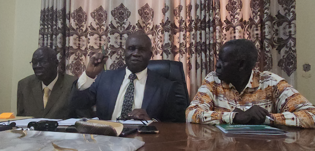The South Sudan Ministry of Higher Education, Science, and Technology on Monday rubbished allegations that the recent Indian Government Scholarship selection criteria were based on tribalism, insisting that they were based on performance and merit.
Netizens took to social media last week, expressing dissatisfaction with the selected candidates for the 30 scholarships, who appear to have been from a particular ethnic group.
The complaint came after the ministry recently released a list of selected students chosen to travel to India under the Indian Council for Cultural Relations (ICCR) scholarship program.

Addressing a press conference in Juba, Prof Job Akuei Alith, Director General for Admission and Chairperson of the Scholarships Committee in the Ministry of Higher Education, said the selection criteria for the candidates were based on the highest scores in the certificates of the candidates who applied for the scholarships.
“If this selection that was done lacked merit, then this is what the media should tell us: who did we leave out that has scored very high? This is higher education, and the advanced world is basing their education on merit, on best performance,” he charged. “If South Sudanese are not happy about merit, then we are here to be challenged. If there is anybody who had very high marks and we left him out, we are ready to accept the blame.”
Prof. Akuei clarified that the application process for the scholarships was done online and that the Indian Council for Cultural Relations requested the Government of South Sudan to select. Subsequently, the Ministry of Higher Education passed it to the scholarship committee to make the selections.
“The Indian universities had offered 457 admission letters to South Sudanese applicants, and the number of scholarships offered was only 30 vacancies to be distributed to 457 applicants,” he disclosed. “The scholarships were offered to so many categories, including undergraduates and postgraduate applicants, but were not clearly stated.”
He said the committee decided to allocate 5 slots for postgraduate and master’s programs and 25 for undergraduates, in both arts and sciences.
According to Prof. Akuei, the committee sat, reviewed the certificates of the applicants, and identified the best performers, especially in science and the arts. The selection was then made based on the top five performers in the arts. For PhD and Master’s, a first-class degree was selected.
“This was how the list was done. The 25 undergraduates [applicants] were based on merit in the arts. I do not remember the first person, but the last person had an 88.9 percent score. For sciences, I do not remember the first, but the last person scored 88 percent, that was the selection,” he clarified. “Before we published the list, some media houses went viral and questioned if the selection was based on merit. They also produced their list, and they neglected the list that came from the Indian Embassy.”
The ministry officials, however, did not provide the correct list.
Prof. Akuei added that social media users alleged that there was preferential nomination based on tribalism, that there was no regional representation, and no gender balance.
“These are things that happen in a society that is not well informed, in a society that is not serious about investigating, balancing, and seeing whether this work was done based on some regulations or not,” he noted.
For his part, Dr. Atem Kuir Jok, Director General for Planning and Budgeting and the Acting Director General for Training and External Relations in the Ministry of Higher Education, said the selection process for the scholarship was based on merit, rather than regional representation or gender.
“Why did we not take the affirmative action, why we did not base our selection or nomination on regional or on gender balance basis?” he asked, and added: “The chances were very tight and these chances are going outside the country and there will be no consideration outside or in India that X and Y were selected because they came from the less developed areas or South Sudan or these are gender based affirmative action, they will not be considered like that.”
“Rules and regulations in higher education clearly state the competitive procedures we should take when we are selecting students for our universities or scholarships. Those rules are here at the ministry, and these rules were developed by the Council of Higher Education,” Dr. Kuir added.
Meanwhile, Dr Adil Athanasio Surur, Undersecretary in the Ministry of Higher Education, said they are working towards eliminating scholarship programs and focusing higher education on research that solves the South Sudanese problems.
“Scholarship is not everything. We are moving towards domesticating higher education here because we need our areas here, which are very fertile for research to be conducted, we will research, it is our scholars, students to do the research in the country,” he said. “Why not approach our problems scientifically? Child kidnapping, cattle rustling, these can be approached scientifically, and the root causes of the problems could be sociological, economic. So, the way forward is we are going to send our students out for postgraduate and other specializations that are not in the country.”




